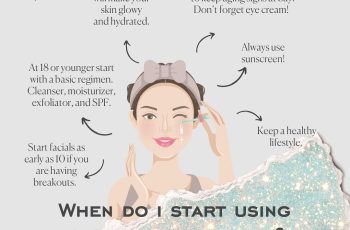
What Does Vitamin C Serum Do For Spots?
Among all the active ingredients commonly found in skincare products, vitamin C stands out as a firm favourite. Many people seeking a youthful, radiant complexion turn to vitamin C serums.
This is because of the numerous benefits vitamin C offers to the skin. Once you start using a vitamin C serum regularly, you might find it hard to stop.
In this article, I will explain in detail the benefits of vitamin C serums and how they specifically help with spots and pigmentation issues.
What Does Vitamin C Serum Do For Your Skin?
Vitamin C serums usually contain forms of the vitamin called ascorbic acid or L-ascorbic acid. These belong to a group known as Alpha Hydroxy Acids (AHAs).
AHAs are known for their ability to exfoliate the skin gently by removing dead skin cells. The outer layer of skin often accumulates dead cells that cause dullness, rough texture, and sometimes spots or breakouts.
Using a vitamin C serum helps by dissolving this dead skin buildup, revealing fresher, smoother skin underneath.
This exfoliation process reduces the appearance of uneven skin texture, dry patches, and flaky skin. The serum’s effect on skin renewal makes your face look brighter and more youthful over time.
In addition to exfoliating benefits, vitamin C offers significant help in reducing dark spots and post-acne scars.
These spots can darken and worsen if exposed to sun rays or other environmental stressors such as pollution. Vitamin C’s antioxidant properties protect the skin from free radicals.
Free radicals are unstable molecules that damage skin cells and accelerate aging.
One of the key ways vitamin C helps with spots is by slowing down melanin production. Melanin is the pigment responsible for skin colour.
When skin is damaged, melanin can seep through tiny gaps in the skin layers, causing hyperpigmentation or dark spots.
You can think of vitamin C as a “plug” that blocks melanin from leaking out, reducing the intensity of dark spots and scars over time.
Key Benefits of Vitamin C for Your Skin
Reduces Sun Damage: Vitamin C helps lighten surface-level dark spots caused by sun exposure and lessens acne scarring.
Brightens Complexion: It visibly improves dull or blotchy areas, giving skin a radiant glow.
Protects Against Irritation: Its antioxidant nature shields the skin from inflammation and flare-ups caused by environmental aggressors like pollution and UV rays.
Speeds Healing: Vitamin C can accelerate the natural repair processes of the skin, helping wounds and blemishes heal faster.
Vitamin C is highly effective, but like all AHAs, it can increase your skin’s sensitivity to the sun.
Therefore, it is essential to apply a broad-spectrum sunscreen with at least SPF 30 every day to prevent further damage.
If you want to learn more about the different forms of vitamin C and how they benefit your skin, check out our detailed guide dedicated to ascorbic and L-ascorbic acid.
Can Vitamin C Serum Cause Pimples?
Interestingly, vitamin C serum can actually help fight pimples rather than cause them.
If you are dealing with blackheads, whiteheads, or other blemishes, vitamin C’s exfoliating action helps keep pores clean.
By removing bacteria, excess oils, and debris from your pores, it prevents clogging which leads to breakouts.
For larger, inflamed spots, vitamin C reduces swelling and redness while speeding up the healing of damaged skin.
This is especially helpful if you tend to pick at your blemishes, which can worsen scarring and pigmentation.
If you notice pimples appearing after starting vitamin C, it may not be the vitamin C itself causing them.
Sometimes, other ingredients mixed into the serum formula can irritate the skin or clog pores. For example, heavier oils or emollients might not suit oily or acne-prone skin types.
Choosing the Right Vitamin C Serum for Your Skin
When selecting a vitamin C product, consider your skin type carefully. Avoid ingredients that might cause imbalances or breakouts.
For example, oily skin types should generally avoid ingredients like shea butter or heavy creams, as these can clog pores.
On the other hand, dry skin types might want to avoid exfoliating acids such as salicylic acid, which can be overly drying.
Choosing a formula tailored for your skin ensures you get the benefits of vitamin C without negative side effects.
When Should I Apply Vitamin C Serum to My Face?
Applying skincare products in the correct order can be confusing, but there is a simple rule to remember: apply from the thinnest to the thickest texture.
Since serums are lightweight and rich in active ingredients, they should be applied after toners or chemical exfoliants but before moisturizers.
This sequence allows the vitamin C to penetrate deeply into the skin without being blocked by heavier creams or oils.
Many skin experts recommend using vitamin C serum in the morning. Applying it early helps brighten your skin and gives you a fresh, radiant look throughout the day.
The antioxidant effects also protect your skin against daily environmental stress.
Others prefer applying vitamin C in the evening, believing that nighttime use allows the serum to work without interruption from sun exposure or pollution.
Both approaches are valid, and you can choose what suits your routine best.
Does Vitamin C Help Dark Spots?
Vitamin C is widely praised for its ability to reduce dark spots caused by sun damage, acne scarring, or hyperpigmentation. These spots form deep in the skin, making them difficult to treat fully.
Thanks to its exfoliating and antioxidant properties, vitamin C gradually improves the look of your skin within 4 to 6 weeks of consistent use.
While it cannot completely erase dark spots, it makes them noticeably lighter and less visible.
Imagine a white tablecloth stained with a single black peppercorn. Crushing that peppercorn into powder spreads the dark pigment over a wider area, making it less obvious.
Vitamin C works in a similar way by dispersing pigmentation so spots blend more naturally with your skin tone.
Side Effects of Vitamin C Serum
Some people experience a mild tingling or stinging sensation when first applying vitamin C serum. This is a normal reaction and should last only a few seconds.
However, if you notice any of the following symptoms, it is best to stop using the product immediately:
Rashes or hives
Flaking or peeling skin
Persistent redness
Itching or irritation
Tightness or discomfort
Severe dryness or cracking
If any of these occur, it means the serum is too potent or not suitable for your skin. Consult a dermatologist or skincare professional to find a safer alternative.
Final Thoughts
Vitamin C serum offers many benefits, including brightening the skin, reducing spots, protecting from environmental damage, and speeding up healing.
It is a valuable addition to many skincare routines.
Always remember to pair it with sunscreen during the day to avoid increased sensitivity to UV rays. Choose your serum wisely based on your skin type and any other active ingredients it contains.
If you want to explore other exfoliating acids, learn about AHAs and BHAs, or get more skincare advice, feel free to visit our website or subscribe to our YouTube channel, The Green Sofa.
Our experts share tips to help you achieve healthy, glowing skin with confidence.


